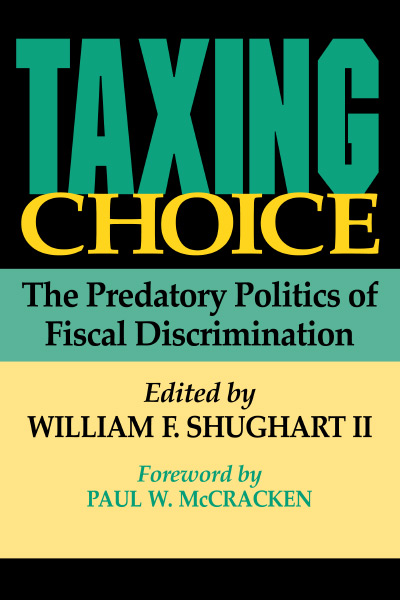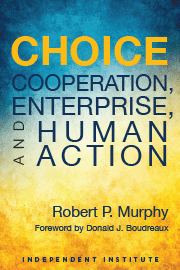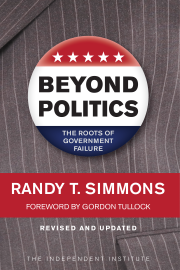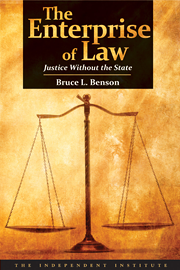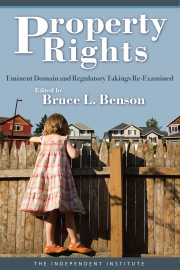| List Price: | ||
| Price: | $18.90 | |
| Discount: | $11.05 (Save 37%) |
| List Price: | ||
| Price: | $18.90 | |
| Discount: | $11.05 (Save 37%) |
Overview
So-called “sin taxes”—the taxing of certain products, like alcohol and tobacco, that are deemed to be “politically incorrect”—have long been a favorite way for politicians to fund programs benefiting special interest groups. But this concept has been applied to such “sinful” products as soft drinks, margarine, telephone calls, airline tickets, and even fishing gear. What is the true record of this selective, often punitive, approach to taxation?
Taxing Choice shows that the record of “sin taxes” has been anything but successful, as they have hindered economic progress and failed to deliver the promised social benefits. In addition, the costs of selective taxation fall disproportionately on lower income groups while politically powerful special interest groups benefit. “Sin taxes” also foster political corruption and self-serving, largely unaccountable bureaucracies. Furthermore, policies discriminating against certain products and behaviors through tax policy represent ominous trends that can easily be extended into other areas of life. If tobacco and alcohol are considered “dangerous” and subject to discriminatory taxation, what is to prevent the same taxes from being applied against fatty foods, sunbathing, or even obesity?
Nineteen distinguished scholars analyze the history, applications, and results of “sin taxes” in this volume. This is a timely and far-reaching book of great interest to economists, policy makers, historians, sociologists—or anyone who pays taxes!
Award:
Sir Antony Fisher International Memorial Award (1998)
Contents
Foreword
Paul McCracken
Preface
William F. Shughart
II
Introduction and Overview
William F. Shughart
II
I: The Political Economy of Excise Taxation
- The Economics of the Nanny State
William F. Shughart II - Excise Taxes in Historical Perspective
Brenda Yelvington - Whisky, Parchment, and Margarine
Adam Gifford, Jr.
II: The Politics of Excise Taxation
- The Politics of Selective Excise Taxation
Randall G. Holcombe - Overcoming Taxpayer Resistance by Taxing and Earmarking Revenues
Dwight R. Lee - Excise Taxes to Fund Politically Correct Propaganda
Thomas J. DiLorenzo - Bureaucratic Incentives and the Transition from Taxes to Prohibition
Gary M. Anderson
III: Alcohol and Tobacco
- Prohibition—The Ultimate Tax
Mark Thornton - Predatory Public Finance and the Origins Of the War on Drugs 1984-1989
Bruce L. Benson and David W. Rasmussen - Taxation of Alcohol and Control of Social Costs
Richard E. Wagner - Taxation and the Consumption of Wine—Are Excise Taxes the Answer to the Healthcare Crisis?
Paula A. Gant and Robert B. Ekelund, Jr. - Bordering on Chaos—Fiscal Federalism and Excise Taxation
Richard K. Vedder
IV: Constitutional Liberties and Excise Taxation
- Wealth Creation as a “Sin”
Jonathan R. Macey - Strict Liability, Gun Control, and Excise Taxes
Bruce H. Kobayashi - Civil Forfeiture as a Tax
Donald J. Boudreaux and Adam C. Pritchard - Excise Taxation in the Rent-Seeking Society
Gordon Tullock
About the Contributors
Index
Detailed Summary
“Nineteen eighty-four arrived ten years behind schedule.” With those words, Taxing Choice: The Predatory Politics of Fiscal Discrimination, edited by University of Mississippi economist William F. Shughart II, begins a journey aimed at showing that in tax policy, things, as librettist William S. Gilbert wrote, “are seldom what they seem.” Shughart has marshalled the work of 17 scholars to investigate the economics, history, and politics of selective excise taxes, including those taxes on tobacco, alcohol, gasoline, and guns, which, at least in theory, are supposed to influence consumer choices in order to bring about more rational decision making in the marketplace.
As a work in the tradition of the public choice school, Taxing Choice goes well beneath the surface to show that more is at work than government’s enlightened guidance of consumer activity for the public interest. As in so many other areas, it seems, as Shughart writes, that “pressure-group politics underlies the push for selective taxation.” In other words, a facade of economic theory has been pasted together to rationalize less attractive motives for particular taxes: revenue raising, protection from competition, and nanny-like intrusion into personal lifestyles.
Nanny-State Economics Debunked
The classic economic defense of selective excise taxes is debunked by Shughart in Chapter 1. There he shows the weakness of three commonly made arguments: 1) that excise taxes on tobacco and alcohol raise revenue in ways that minimize social costs; 2) that such taxes are like user fees because they target those who heavily use certain government and private services, such as health care; and 3) that such taxes can compensate for burdens imposed on innocent victims by users of the products taxed. He argues that while those arguments may apply in special cases, they do not constitute a general case for such taxation.
Shughart also shows that excise taxes twice violate the fairness canon of taxation because they hit poorer people harder than richer people (they are regressive) and they hit some products but not others. He points to a tension in excise-tax policy: to the extent it discourages consumption of the taxed product, it is a bad revenue raiser.
Excise Taxes in American History
Chapters Two and Three look at selective excise taxes through American history. Brenda Yelvington of the University of Mississippi shows that while the earliest excise taxes, such as the tax on whiskey, were partly motivated by a desire to tax alleged luxuries, they gained prominence as revenue raisers during America’s wars. Excise taxes also played an important role in Franklin Roosevelt’s New Deal. Such taxes, though they still exist, became less important when the personal income tax was passed in 1913 and became a mass tax during World War II. With the Clinton proposal to use the tobacco tax to discourage smoking and fund health care, the government has come full circle in justifying excise taxes.
In the following chapter Adam Gifford, Jr. of California State University, Northridge, looks at three historical examples of the excise tax: the whiskey tax, including the one that excited rebellion in western Pennsylvania in 1791; the oleomargarine tax; and England’s knowledge tax, that is, taxes on newspapers and other means of disseminating knowledge. Gifford’s discussion demonstrates how excise taxes are used for purposes other than raising money. The tax on liquor was in part motivated by the desire to impose temperance. The oleomargarine tax was classic “rent seeking,” in which the dairy interests used the power of the state to burden a competitor. The knowledge tax was a form of rent seeking too; the government sought to benefit itself by “handicapping the competition in the market for political ideas.” Gifford concludes by showing how those taxes influenced the development of the U.S. government.
Predatory Politics
The next several chapters examine the predatory nature of excise taxes. Randall Holcombe of Florida State University looks at specific examples of excise taxation—soft drinks and containers, airline tickets, tobacco—to demonstrate the political costs and welfare losses entailed. Holcombe argues that the overall costs of excise taxes are higher than those from broad-based taxes because the tax often falls on a subgroup of the population. Thus “the majority has an opportunity to get something for nothing” and the subgroup will be willing to spend lots of money to protect itself. The incentive to use selective excises lies in the politicians’ ability to sell a tax to a majority of voters precisely because it will fall on a minority. Holcombe concludes by arguing that the economic justifications for excise taxation ignore political realities, namely that taxes result from a process in which the legislature brokers the demands made by opposing interests.
Dwight R. Lee of the University of Georgia follows with a chapter showing how the political authorities use economic justifications for excise taxes to overcome public resistance. He begins by noting that the politicians’ appetite for revenue is insatiable because the transferring of revenue to special-interest clients is the source of their political support. Yet as taxes and spending increase, the people become more resistant. Consequently, politicians would be attracted to a method of taxation that relaxes that resistance. An excise tax can dissolve taxpayer resistance by being sold as a way to discourage the sin and to compensate for damage created by the sinners. Lee shows that the earmarking of excise revenues would seem to restrict the activities of politicians, but the limitation is more apparent than real. Since money is fungible, the new revenues can allow those from general taxes to be used for other purposes.
The chapter by Thomas J. DiLorenzo of Loyola College in Maryland illustrates the principle established by Lee. DiLorenzo uses as a case study California’s 1988 referendum to triple of the state’s cigarette tax. The antismoking lobby said it wanted the tax increase not to raise money but to discourage smoking. But DiLorenzo shows that how they went about their mission belies that claim. By going the route of a constitutional amendment, the lobby was able to circumvent previously enacted spending and taxing limits and to earmark the new revenues for their favorite projects, including anti-tobacco education, (dubious) research on tobacco-related diseases, and medical care for poor people. “California’s cigarette tax revenues have fueled an enormous bureaucracy of state health ‘officials,’ university researchers, and nonprofit political activists, all of whom have created a formidable coalition lobbying for the continuation and expansion of the program.”
Gary M. Anderson of California State University, Northridge, concludes Part I of the book by showing the curious connection between sin taxes and prohibition. He seeks to explain the paradox that governments have given up revenue-producing taxes for revenue-draining prohibition. Why? Anderson resolves the paradox by employing the “interest-group” model of government; that is, organized groups, including groups within the government itself, have an incentive to influence the state for the benefits that inevitably flow from regulation. Tracing the tendency of sin taxation to move toward prohibition with four examples, the War on Drugs, alcohol prohibition, gun control, and cigarettes, he shows how in each case, law-enforcement and other government bureaucracies have an incentive first to increase the tax to prohibitive levels and then to promote outright prohibition in order to bolster their power, even if means the treasury will forgo revenue.
Taxation and Prohibition
Part II takes a microscope to selective taxes. Mark Thornton, outlining the puritan impulse in America, shows that prohibition was no stranger to these shores when alcohol was constitutionally prohibited in 1920. He closely looks at the history of various prohibitions, including alcohol and drugs. Among the lessons he draws are these: prohibitionists see selective taxation as a policy alternative to an outright ban; each policy can create the conditions that make the other “necessary”; the prohibitionist agenda began as a religious program to rid society of sin but became secularized. Thornton concludes by warning that “if current trends persist, America will be moving towards more prohibitions.”
Bruce L. Benson and David W. Rasmussen of Florida State University follow with a close examination of the War on Drugs from 1984 to 1989, a period in which drug arrests skyrocketed then fell. They describe how what began as a tax on drugs in 1914 turned into prohibition thanks to the intragovernmental lobbying of law enforcement bureaucrats. Competition among bureaucracies also was important to the story. The authors pay particular attention to asset forfeiture (confiscation), a tool that creates perverse wealth incentives for law-enforcement officials.
More myths fall in Richard Wagner’s chapter on alcohol taxation. The George Mason University economist shows that the tax cannot be justified on the grounds that drinkers impose significant costs on society. In fact, much of what are considered social costs are in reality private costs. For example, the lost productivity of heavy drinkers is paid for not by society by those workers, who will reap a lower wage. Similarly, the added medical costs from drinking, if indeed there are such, are born mostly by the drinkers themselves. Drunk drivers do indeed create social costs, writes Wagner. But taxation is not the way to correct for them because it indiscriminately hits responsible users of alcohol. Penal policies that target the guilty are preferable.
Unintended Consequences
Paula A. Gant of the University of Louisville and Robert B. Ekelund Jr. of Auburn University turn to the matter of unintended consequences in their chapter on alcohol taxes, particularly the tax increase in President Bush’s 1990 budget package. That increase imposed a proportionately larger share of the increase on wine versus beer and spirits. The authors point out that not only did that discriminatory increase violate accepted notions of equity, it also shifted consumption away from wine because it became relatively more expensive than beer and spirits. The irony is that wine is more closely associated with responsible drinking than either spirits or beer. And wine has been linked to health benefits. Thus, this tax increase, which was partly justified as a corrective tax, was especially ill advised.
Richard Vedder of Ohio University brings Part II to a close with a chapter that demonstrates that cigarette taxation at the state level collides with ever-present propensity of people to buy in the cheapest jurisdictions and to smuggle. Those phenomena limit revenues and restrain states in their tax policies, as shown by recent experiences in Canada and along the California-Mexico border. Vedder looks closely at the differences in tax levels and the extent of cross-border activity.
Taxation and the Constitution
Jonathan R. Macey of Cornell University School of Law shifts gears as he opens Part III with a chapter on the effects of selective taxation of executive salaries over $1 million a year and the corporate compensation arrangements known as “excess golden parachute payments” and “greenmail.” Those taxes were motivated not by sound economic thinking, but by an egalitarian suspicion of undefined corporate greed. For Macey, these were punitive sin taxes; the sin was that of making “too much” money. He shows that each of the targeted activities is integral to the efficient operation of the capital markets and that taxation exacts a toll on the entire economy.
Since taxation can have consequences similar to prohibition and since the Second Amendment to the U.S. Constitution affirms the right of people to keep and bear arms, excise taxes on guns have constitutional implications, argues Bruce H. Kobayashi of George Mason University Law School in his contribution to Taxing Choice. The same can be said for laws assigning liability for the misuse of guns to third parties—an indirect tax. Kobayashi begins by noting that the gun prohibitionists would prefer an outright ban, but pragmatism forces them accept taxation instead. As with so many excise tax advocates, they argue— mistakenly, the author shows—that the tax is necessary to compensate for the alleged social costs from gun use. He states, rather, that taxation punishes lawful gun owners and could increase crime by discouraging ownership by law-abiding citizens. In the course of his argument, Kobayashi debunks several celebrated studies purporting to show that guns cause violence.
Civil Forfeiture as Sin Tax
Government has increasingly found it attractive to confiscate the property of certain suspected criminals rather than to prosecute them under the exacting criminal standard of guilt beyond a reasonable doubt. Donald J. Boudreaux of George Mason University and Adam C. Pritchard of the University of Michigan Law School devote their chapter to the civil forfeiture laws, which permit that activity, and show that such confiscation is really a sin tax: it makes up for revenue lost under prohibition. Under civil forfeiture, government has a more lenient standard to uphold, and those who lose property have the burden—unlike in criminal proceedings—to show that it should be returned; the presumption is of guilt not innocence. Boudreaux and Pritchard argue that contrary to the drug warriors’ belief, forfeiture is not an efficient tool of law enforcement. Rather, inefficiency is promoted by a policy that lets law enforcement agencies reap the proceeds from confiscation. The authors examine the history of forfeiture law and argue that it has “freed the government from the constitutional tethers created by America’s founders to harness Leviathan.”
The book closes with a refreshing chapter about taxes and smoking, by Gordon Tullock of George Mason University. Tullock takes up the issue of the external effects of smoking, which are used to justify the tobacco tax. He suggests that smoking could actually save the public money—for example, if the suggestive studies of tobacco as a preventative for Alzheimer’s disease are correct. Moreover, smokers who die relatively young of lung cancer will not get more expensive, longer lasting diseases when they are older or collect Social Security. He also points out that raising the cigarette tax could reduce revenues. All of this demonstrates that “fiscal arguments are not decisive.” Ultimately, Tullock writes, policies about smoking must be made on non-economic criteria.
The seemingly plausible, but flawed, case for selective excise taxes got a big boost from the Clinton administration when it released its health-care reform, complete with an increase in the tobacco tax. We have not heard the last of such proposals. Thus, Taxing Choice is a timely and important contribution to the public debate.
Praise
“Explicit manipulation of the tax system to control personal choices violates the long-standing principle that taxes should be general. Discrimination through taxation is as destructive to democracy and liberty as discrimination in any other form. Taxing Choice exposes the fiscal rot that ‘targeted’ tax adjustments represent.”
—James M. Buchanan, late Nobel Laureate in Economic Sciences, George Mason University
“Taxing Choice is an interesting volume. I share its dislike for arbitrary tax discrimination.”
—Richard A. Musgrave, Professor of Economics, University of California, Santa Cruz
“Excise taxes used to lie in the dustbin of economics. They were detested, anti-egalitarian devices. Economists wrote about excises only to decry their deadweight costs and regressivity. Sometimes, an oddball politician would propose an excise tax or an increase in an excise tax. . . . Then, A.C. Pigou decided to major in economics, and the world of excises was turned on its head. Now the modern legislator rises to proclaim that the poorness of the poor is not the issue at all; rather, it is their bad habits that matter, and we must restrict their 'pollution' (optimally,of course) with an excise tax. . . . Our habits impose 'social costs' on 'society'? . . . . If you really would like an answer to this question, you need to read this book. It is a first-class repudiation of the ‘modem theory of excise taxation from virtually all perspectives. There is no comparable book like this, and it ought to be required reading in all public finance/public choice courses. Shughart and the other contributors to this volume are all excellent economists and lawyers with fine reputations who bring their expertise and creativity to bear on excise taxation. . . . Will the book lead the social costists to recuse themselves from further faulty analysis? I doubt it. The lure of additional revenues to be spent on professors and public health programs will probably be too much. . . . It will take more than Shughart and his distinguished co-workers to derail the Nanny State. As we speak, it is gathering steam and revenues based upon absolutely fallacious arguments.This book will help because it is part of the rent-seeking, rent-protecting equilibrium. No doubt about that. The deeper solution is to fashion a return to a more civil and constitutional world in which meddlesome preferences were not accommodated. We all have bad habits; the list is large; we best not start down the road of picking on some habits and not others, lest we end up in a place where no one (the social costists included) wants to be. We have completely lost such restraint. It's time to draw a line; join Shughart and company and Push Back.”
—Public Choice
“Taxing Choice deals with extremely important issues. Most readers will probably be outraged—some because they agree with the analysis and some because they do not. Few will find it not to be provocative.”
—Charles E. McLure, Jr., Former Deputy Assistant Secretary of the Treasury for Tax Analysis
“Selective excises depend on the arrogant presumption that meddlesome experts know better than consumers how they should spend their own earnings. Taxing Choice exposes the conventional rationale for discriminatory, regressive excise taxes as a faded remnant of the ideology of technocratic central planning. The distinguished authors show that excise taxes on ‘sins’ and ‘luxuries’ have little to do with genuine user fees, with raising revenues efficiently, or with contradictory textbook theories that date back fifty years. In reality, the practice of excise taxation is best explained by myopic log-rolling, pork-barrel politics. Taxing Choice provides a powerful and unique challenge to archaic academic dogma, and does so without being stuffy or complex. As a bonus, this lively book offers a surprisingly thorough and readable lesson in the politics and economics of taxation in general.”
—Alan Reynolds, Director of Economic Research, Cato Institute; former Research Director, Kemp Tax Reform Commission
“There are simply no compelling economic arguments in favor of the government encouraging or discouraging personal decisions through tax policy. When government picks one special interest over another, someone always wins, and inevitably, someone always loses. Are government officials better able to make decisions than free individuals in the marketplace? Absolutely not.”
—Richard C. Shelby, U. S. Senator
“Taxing Choice is a much needed book: it provides a systematic, insightful, and provocative treatment of a major fiscal instrument that gets little attention in our economy: selective excise taxes. The book makes clear that such major taxes in our economy need to be the subject of careful analysis and debate, not simply the result of the dictates of politically powerful special-interest groups.”
—Wallace E. Oates, Professor of Economics, University of Maryland
“The use of selective taxes fits the contemporary philosophy that the route to the good social and economic order is to blueprint this good society and then use the instruments and power of government to implement the blueprint. (This contrasts sharply with that of basic liberalism—which sees the role of government to establish a stable framework or structure, within which the optimum pattern will emerge naturally as people give expression to their preferences and knowledge and creativity.) the role of selective taxes and the criteria which should guide their use—these are issues that deserve much more analysis than they have received in recent years, and that is the objective of Taxing Choice. It comes along none too soon since far more is involved here than such phrases as nuisance taxes or sin taxes might seem to imply.”
—Paul W. McCracken, late former Chairman, President’s Council of Economic Advisors; Professor of Economics, Graduate School of Business Administration, University of Michigan
“Taxing Choice could hardly make its appearance at a more propitious time. Indeed, it is largely because of this intellectual effort that we actually have new tax reform legislation. However imperfect that may be when measured by the needs of the nation and the abuses of the system, it moves a good distance to at least address the political nature and social consequences of ‘fiscal discrimination’ detailed in the book.”
—Irving Louis Horowitz, late Hannah Arendt Distinguished Professor of Sociology, Rutgers University
Author
William F. Shughart II is Senior Fellow at The Independent Institute and Professor of Economics and Finance at the University of Mississippi.
News
Events
| Event | Date | |
| Research Director William Shughart speaks at “Coal – Evolving in the Energy Space” conference, Park City, UT | Wed., Aug. 12, 2015 |

